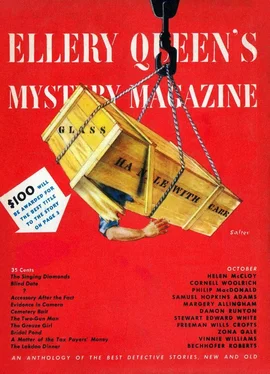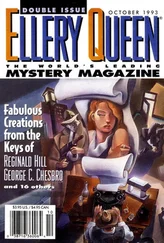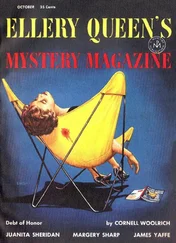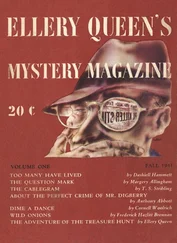Марджери Аллингем - Ellery Queen’s Mystery Magazine. Vol. 14, No. 71, October 1949
Здесь есть возможность читать онлайн «Марджери Аллингем - Ellery Queen’s Mystery Magazine. Vol. 14, No. 71, October 1949» весь текст электронной книги совершенно бесплатно (целиком полную версию без сокращений). В некоторых случаях можно слушать аудио, скачать через торрент в формате fb2 и присутствует краткое содержание. Город: New York, Год выпуска: 1949, Издательство: The American Mercury, Жанр: Классический детектив, на английском языке. Описание произведения, (предисловие) а так же отзывы посетителей доступны на портале библиотеки ЛибКат.
- Название:Ellery Queen’s Mystery Magazine. Vol. 14, No. 71, October 1949
- Автор:
- Издательство:The American Mercury
- Жанр:
- Год:1949
- Город:New York
- ISBN:нет данных
- Рейтинг книги:5 / 5. Голосов: 1
-
Избранное:Добавить в избранное
- Отзывы:
-
Ваша оценка:
- 100
- 1
- 2
- 3
- 4
- 5
Ellery Queen’s Mystery Magazine. Vol. 14, No. 71, October 1949: краткое содержание, описание и аннотация
Предлагаем к чтению аннотацию, описание, краткое содержание или предисловие (зависит от того, что написал сам автор книги «Ellery Queen’s Mystery Magazine. Vol. 14, No. 71, October 1949»). Если вы не нашли необходимую информацию о книге — напишите в комментариях, мы постараемся отыскать её.
Ellery Queen’s Mystery Magazine. Vol. 14, No. 71, October 1949 — читать онлайн бесплатно полную книгу (весь текст) целиком
Ниже представлен текст книги, разбитый по страницам. Система сохранения места последней прочитанной страницы, позволяет с удобством читать онлайн бесплатно книгу «Ellery Queen’s Mystery Magazine. Vol. 14, No. 71, October 1949», без необходимости каждый раз заново искать на чём Вы остановились. Поставьте закладку, и сможете в любой момент перейти на страницу, на которой закончили чтение.
Интервал:
Закладка:
“Why do you suppose he picked a ranch for a hide-out? He was raised here. You’d think someone would have recognized him.”
“He’d been gone fifteen years, and I guess he took good care to keep out of people’s way. He stayed in the shadow at the bar, and Jess Whidden said he kept to himself.”
“I suppose Mrs. Smith sold the broach and chickens, scraped up all the money she could for the child.”
“Yes, Zed and Belle were collecting money for a real getaway — hence, the robberies. They left Tampa broke, and they used the child to get money from Mrs. Smith. Zed knew how his mother always felt about children.”
Mrs. Carlton ran a hand through her modish hair-do, her eyes twinkling.
“Minnie, do you realize you’ve just undermined the reason you gave for resigning? It was those pecky little bits of information you’ve collected for fifteen years that helped you figure this thing out.”
Miss Minnie rubbed her nose ruefully. “Well, even a blind hog stumbles on a few acorns occasionally.”
Mrs. Carlton said, “There’s still just one thing I don’t understand — why Mrs. Smith sent us that anonymous note about having a job at Jut’s.”
Miss Minnie grinned, and snapped a bobby pin around her cigarette stub. “Mrs. Smith’s a smart woman — and she’s known the State Welfare Board for a long time. She knew nothing would send us prying and digging quicker than the news that a client had a job — and was still getting assistance. She knew when it came to a question of money, this agency purely root-hog, or dies.”
The Hand on the Latch{ Copyright, 1909, 1937, by Mary Cholmondeley. Reprinted by permission of Dodd, Mead & Company, Inc. }
by Mary Cholmondeley
When we first read “The Hand on the Latch” — many years ago — we took for granted that the author was American. True, the surname Cholmondeley is exceptionally British, but many Americans, especially those who can trace their ancestry back to the “Mayflower,” bear typically English names. The evidence in the story itself so far outweighed the nationality suggested by the surname that we never even dreamed the author could have been an Englishwoman.
For this story, in every conceivable respect, is American. The locale is obviously Western or mid-Western — in the very first paragraph we are given the background of the snow-covered prairie and the rough-hewn log hut, and later we hear the prairie dog and coyote. The period is obviously that of the Civil War — there are references to the great conflict, to the North and South, and to a little picture of President Lincoln on the mantel-shelf. The characters? — who would question their authentic American quality? The mood? — surely the author had read and subconsciously absorbed the accents of Ambrose Bierce, that typically American writer. The dialogue? — not a syllable off key for the period and the place.
And yet this story was written more than forty years ago by an Englishwoman who, to the best of our knowledge, never even visited America!
Today Mary Cholmondeley is a “ forgotten” writer. Even her most “famous” novel, RED POTTAGE, which caused a minor literary scandal just before the turn of the century, is now as forgotten as the author herself. That she was the aunt of the novelist Stella Benson is also a fact lost in limbo. But somehow we cannot believe that Mary Cholmondeley’s “The Hand on the Latch” will ever pass into complete oblivion. From time to time, so long as short stories are reprinted and so long as anthologies survive as an editorial form, “The Hand on the Latch” will make an occasional appearance in print — a voice out of the past that will not be stilled...
She stood at her low window with its uneven wavering glass, and looked out across the prairie. A little snow had fallen — not much, only enough to add a sense of desolation to the boundless plain, the infinite plain outside the four cramped walls of her log hut. The log hut was like a tiny boat moored in some vast, tideless, impassable sea. The immensity of the prairie had crushed her in the earlier years of her married life, but gradually she had become accustomed to it, then reconciled to it, at last almost a part of it. The gray had come early to her thick hair, a certain fixity to the quiet courage of her eyes. Her calm, steadfast face showed that she was not given to depression, but nevertheless this evening, as she stood watching for her husband’s return, for the first distant speck of him where the cart rut vanished into the plain, a sense of impending misfortune enfolded her with the dusk. Was it because the first snow had fallen? Ah me! how much it meant. It was as significant for her as the gray pallor that falls on a sick man’s face. It meant the endless winter, the greater isolation instead of the lesser, the powerlessness to move hand or foot in that all-enveloping shroud; the struggle, not for existence — with him beside her that was assured — not for luxury — she had ceased to care for it, though he had not ceased to care for her sake — but for life in any but its narrowest sense. Books, letters, human speech, through the long months these would be almost entirely denied her. The sudden remembrance of the larger needs of life flooded her soul, touching to momentary semblance of movement many things long cherished, but long since dead, like delicate sea plants beyond high-water mark that cannot exist between the long droughts when the neap tide does not come. She had known what she was doing when against the wishes of her family she of the South had married him of the North, when she left the busy city life she knew, and clave to her husband, following him over the rim of the world, as women will follow while they have feet to follow with. She was his superior in birth, cultivation, refinement, but she had never regretted what she had done. The regrets were his for her, for the poverty to which he had brought her, and to which she had not been accustomed. She had only one regret, if such a thin strip of a word as regret can be used to describe her passionate controlled desolation, immense as the prairie, because she had no child. Perhaps if they had had children the walls of the log hut in the waste might have closed in on them less rigidly. It might have become more of a home.
Her mind had taken its old mechanical bent, the trend of long habit as she looked out from that low window. How often she had stood there, and thought, “If only we might have had a child.” And now by sheer force of habit she thought it yet again. And then a slow rapture took possession of her whole being, mounted, mounted till she leaned against the window-sill faint with joy. She was to have a child after all. She had hardly dared believe it at first, but as time had gone on a vague hope, quickly suppressed as unbearable, had turned to suspense, suspense had alternated with the fierce despair that precedes certainty. Certainty had come at last, clear and calm and exquisite as dawn. She would have a child in the spring. What was the winter to her now! Nothing but a step toward joy. The world was all broken up and made new. The prairie, its great loneliness, its deathlike solitude, were gone out of her life. She was to have a child in the spring. She had not dared to tell her husband till she was sure. But she would tell him this evening when they were sitting together over the fire.
She stood motionless in the deepening dusk, trying to be calm. And at last in the far distance she saw a speck arise, as it were, out of a crease in the level earth — her husband on his horse. How many hundreds of times she had seen him appear over the rim of the world, just as he was appearing now! She lit the lamp and put it in the window. She blew the log fire to a blaze. The firelight danced on the wooden walls, crowded with cheap pictures, and on the few precious daguerreotypes that reminded her she too had brothers and sisters and kin of her own, far away in one of those southern cities where the war was still smouldering grimly on.
Читать дальшеИнтервал:
Закладка:
Похожие книги на «Ellery Queen’s Mystery Magazine. Vol. 14, No. 71, October 1949»
Представляем Вашему вниманию похожие книги на «Ellery Queen’s Mystery Magazine. Vol. 14, No. 71, October 1949» списком для выбора. Мы отобрали схожую по названию и смыслу литературу в надежде предоставить читателям больше вариантов отыскать новые, интересные, ещё непрочитанные произведения.
Обсуждение, отзывы о книге «Ellery Queen’s Mystery Magazine. Vol. 14, No. 71, October 1949» и просто собственные мнения читателей. Оставьте ваши комментарии, напишите, что Вы думаете о произведении, его смысле или главных героях. Укажите что конкретно понравилось, а что нет, и почему Вы так считаете.












